Veranstaltungen und Aktivitäten
DIJ Newsletter Winter 2024/25
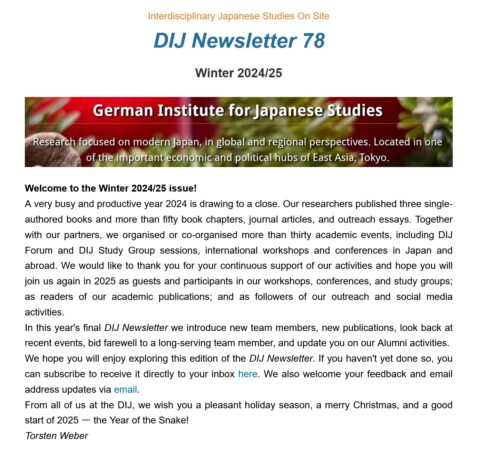 The winter issue of our DIJ Newsletter features updates on our research, publications, and events as well as news from the Institute, our team, and our alumni. We hope you will enjoy exploring this new edition of the DIJ Newsletter. If you haven’t done so yet, you can subscribe to receive our Newsletters directly to your inbox. The full issues and subscription form are available here.
The winter issue of our DIJ Newsletter features updates on our research, publications, and events as well as news from the Institute, our team, and our alumni. We hope you will enjoy exploring this new edition of the DIJ Newsletter. If you haven’t done so yet, you can subscribe to receive our Newsletters directly to your inbox. The full issues and subscription form are available here.
New book chapter by D.A. Neuhaus on Korea and the League of Nations
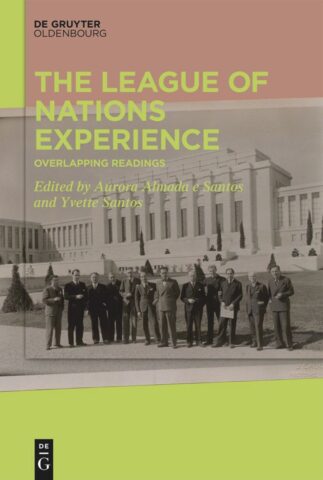
In his chapter “Korea and the League of Nations: from Versailles to the Manchurian Crisis, 1919–1933” Dolf-Alexander Neuhaus examines the relationship between the Korean independence movement and the League of Nations. The chapter elucidates the complex interactions between non-sovereign entities like Korea under Japanese rule and the international organization, offering insights into how Koreans and anti-Japanese nationalists perceived and engaged with the League of Nations during the interwar period. In 1919, when the League was established, Koreans were denied the right to self-govern. However, individuals and factions within the Provisional Government of the Republic of Korea still sought to utilize the League for their ends in the 1920s and early 1930s. By exploring these diplomatic and political dynamics, the chapter presents a nuanced picture of Korea’s struggle for recognition and national self-determination within the broader context of international politics. The chapter is published in The League of Nations Experience: Overlapping Readings (De Gruyter 2025).
New book chapter by Nicole M. Mueller studies reception of Thomas Mann in Japan

In her book chapter „Thomas Mann bei Mishima Yukio, Kita Morio und Tsuji Kunio: Verehrungspathos und Neuverortung als Vorbedingungen einer produktiven kulturüberschreitenden Rezeption“ (in German), DIJ researcher Nicole M. Mueller sheds new light on the reception of Thomas Mann’s literary works by the Japanese authors Mishima Yukio, Kita Morio, and Tsuji Kunio. The idealization of Mann had been an essential element of Japan’s cultural modernization and westernization in the first decades of the 20th century, making him one of the larger-than-life figureheads of Japan’s prewar academic elite. Mishima and his contemporaries developed novel modes of reception based on a critical analysis of Mann’s work. Nicole’s chapter examines the extent to which Mishima’s, Kita’s, and Tsuji’s reception of Mann was conditioned by historical context and what characteristics make cross-cultural literary reception “productive”. The chapter is published in the edited volume Thomas Mann produktiv rezipiert. Zum Fortleben von Werk und Autor (Brill/Fink 2025).
New issue of Contemporary Japan published
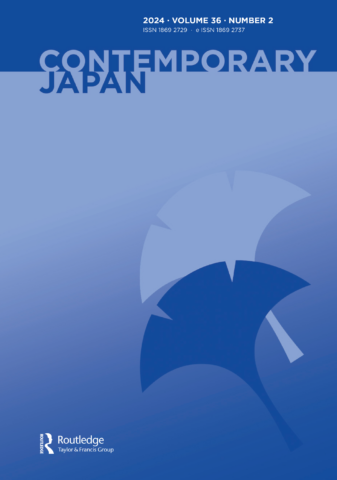
The new issue of Contemporary Japan (vol. 36, no. 2) features five research articles, the biennial 2023 VSJF award-winning paper, and a book review section. The research articles include an inquiry into the relevance and effectiveness of national apologies by Jane Munro; Ryotaro Takahashi addresses the relationship of income inequality and the size of the government in Japan; Ken Hijino analyzes the politics of depopulation in local elections; Silvia Croydon investigates the politics of inclusiveness in terms of consultation on disability policies; and Kristina Iwata-Weickgenannt and Aidana Bolatbekkyzy explore how foodscapes are invoked in critical commentary on the “capitalocene” in post-3.11 Japanese literature. The English translation of the VSJF award-winning paper by David Adebahr offers unprecedented access to the conversations and thought processes behind Japan’s security policy among key political actors in Japan. CJ’s book review section includes recent publications on religion and fundamentalism, the history of Kyoto, public discourse on fertility policies, and the use of robots in eldercare.
New open access article analyses impact of civic engagement on women’s well-being
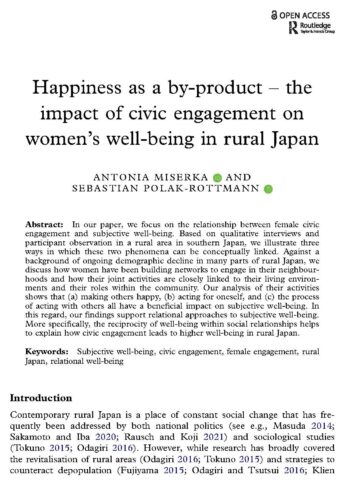 A new open access research article by Antonia Miserka (University of Vienna) and DIJ social scientist Sebastian Polak-Rottmann analyses the relationship between female civic engagement and subjective well-being. Their article „Happiness as a by-product – the impact of civic engagement on women’s well-being in rural Japan“, published in Japan Forum (online first), is based on qualitative interviews and participant observation in a rural area in southern Japan. The analysis shows that (a) making others happy, (b) acting for oneself, and (c) the process of acting with others all have a beneficial impact on subjective well-being. In this regard, the findings support relational approaches to subjective well-being. More specifically, the reciprocity of well-being within social relationships helps to explain how civic engagement leads to higher well-being in rural Japan. The article is an outcome of Sebastian’s research project Supplementing activities of resilience: The impact of demographic change on local activities and civic engagement.
A new open access research article by Antonia Miserka (University of Vienna) and DIJ social scientist Sebastian Polak-Rottmann analyses the relationship between female civic engagement and subjective well-being. Their article „Happiness as a by-product – the impact of civic engagement on women’s well-being in rural Japan“, published in Japan Forum (online first), is based on qualitative interviews and participant observation in a rural area in southern Japan. The analysis shows that (a) making others happy, (b) acting for oneself, and (c) the process of acting with others all have a beneficial impact on subjective well-being. In this regard, the findings support relational approaches to subjective well-being. More specifically, the reciprocity of well-being within social relationships helps to explain how civic engagement leads to higher well-being in rural Japan. The article is an outcome of Sebastian’s research project Supplementing activities of resilience: The impact of demographic change on local activities and civic engagement.
Book by Dolf Neuhaus on Korean-Japanese Interactions and Japanese Colonial Rule in Korea
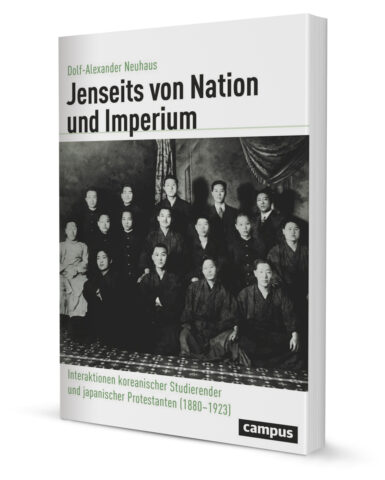
What role did Korean students who came to Japan between 1880 and 1923 play in the discourse on Japan’s colonial and East Asian policies? How did their encounter with Japanese intellectuals of Protestant faith, especially in the environment of the YMCA and the Imperial University of Tokyo, influence their views? Drawing on a wide range of Japanese and Korean sources, Dolf-Alexander Neuhaus‚ new book Jenseits von Nation und Imperium. Interaktionen koreanischer Studierender und japanischer Protestanten (1880–1923) (Beyond nation and empire. Interactions between Korean students and Japanese Protestants, 1880-1923) examines how these students and intellectuals discussed Japanese colonial rule in Korea and the ‚Korean question‘ and how their exchange of ideas influenced Japanese and Korean perceptions of empire, nation, and East Asia. The book is based on Dolf’s doctoral dissertation and is published by Campus in the Global History series.
Open access book by Nicole M. Mueller studies Japanese Thomas Mann translations
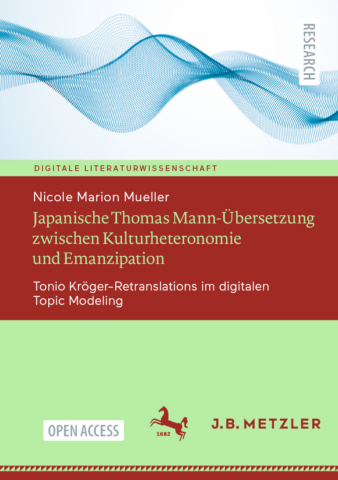
In her new book Japanische Thomas Mann-Übersetzung zwischen Kulturheteronomie und Emanzipation: Tonio Kröger-Retranslations im digitalen Topic Modeling (Japanese Thomas Mann translation between Cultural Heteronomy and Emancipation: Digital Topic Modeling of Tonio Kröger Retranslations), DIJ researcher Nicole Marion Mueller uses innovative digital methods to study Japanese translation pluralism in the 20th century. Focusing on Japanese translations of Mann’s novel Tonio Kröger, she retraces the intensive reception of Mann’s literary works in Japan while paying special attention to the interrelations between translation and a variety of historical contexts and actors – most prominently the elitist kyoyoshugi movement rooted in Japan’s prewar education system. Nicole combines this extensive research work with a topic modeling-based mixed methods approach, which enables her to reveal the previously hidden interactions between the re-translated texts as well as patterns of influence and distinction spanning decades of translation history. The book is published by J.B. Metzler in the Digital Literary Studies series and available open access.
Barbara Holthus explains Germany’s fertility rate development in Japanese journal article
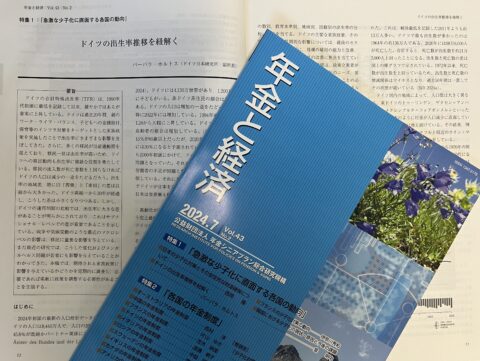 Unlike Japan, Germany’s total fertility rate has shown a slow but steady increase since its lowest point in the early 1990s. What are the factors behind this development? In the article 「ドイツの出生率推移を紐解く」(„Unraveling Germany’s fertility rate development“, in Japanese), DIJ sociologist Barbara Holthus explains how Germany has implemented a mix of family policies targeting time, money, and infrastructure measures for parents. Over the last 20 years, they have had varying influences on the fertility rate. As data shows, migration trends into Germany also play a complex role for its fertility rate, as many migrants are of child-bearing age and first-generation migrants have higher birthrates. In addition, there are significant differences in fertility rates at the sub-national level. Recent macro level influences like war and climate change are also important influences on Germany’s youth, coupled with rising rates in mental health problems. The article is published in a special section on countries facing a rapidly declining birthrate in the summer issue of the Japanese journal Pension and the Economy (『年金と経済』).
Unlike Japan, Germany’s total fertility rate has shown a slow but steady increase since its lowest point in the early 1990s. What are the factors behind this development? In the article 「ドイツの出生率推移を紐解く」(„Unraveling Germany’s fertility rate development“, in Japanese), DIJ sociologist Barbara Holthus explains how Germany has implemented a mix of family policies targeting time, money, and infrastructure measures for parents. Over the last 20 years, they have had varying influences on the fertility rate. As data shows, migration trends into Germany also play a complex role for its fertility rate, as many migrants are of child-bearing age and first-generation migrants have higher birthrates. In addition, there are significant differences in fertility rates at the sub-national level. Recent macro level influences like war and climate change are also important influences on Germany’s youth, coupled with rising rates in mental health problems. The article is published in a special section on countries facing a rapidly declining birthrate in the summer issue of the Japanese journal Pension and the Economy (『年金と経済』).










 Open Access
Open Access 
